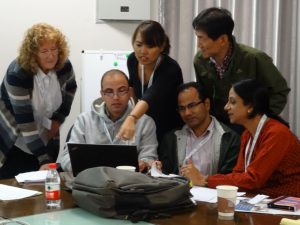Report by Dr Gillian Petrokofsky, University of Oxford, 23 October 2016
http://www.iufro.org/science/special/spdc/actproj/tws-beij/
Aims of the training

Dr. Gillian Petrokofsky, Biodiversity Institute Oxford, and trainees. Photo: Eva Schimpf, IUFRO-SPDC
The 3-day training workshop introduced participants to systematic review as a powerful tool in evidence synthesis.
The tool is used to improve decision-making and any policy formulation that draws on scientific evidence. The workshop explored examples from forestry and natural resource management.
Participants applied techniques of systematic review to develop mini-Protocols focused on how traditional knowledge forest could inform current forest management strategies/policy.
The workshop ran in an open, collaborative environment with shared learning and peer-to-peer support.
This active participation helps build confidence in applying the techniques of systematic review and simulates the work of a real systematic review team in action.
Some of the key topics covered in the training
Evidence – what do we mean? Introduced collaborative systematic reviews and maps tools for robust evidence for policy and practice.
What is the question? Introduced the importance of clear question-framing for research and reviews. Framing focuses on defining: POPULATION(S) that are subject to management interventions or environmental exposures; management or environmental INTERVENTIONS whose effects are either unknown or disputed; COMPARATORS or controls that enable judgments to be made about effects and impacts of management interventions; and clearly defined OUTCOMES that measure effect sizes and trends.
How do we find the evidence? – Introduced the importance and challenges of comprehensive inclusion of relevant evidence and how to construct a good search strategy.
What evidence do we include and exclude? – Introduced the importance of specifying explicitly what evidence is relevant to a particular review.
Additional information: Programme, http://www.iufro.org/download/file/25610/199/sys-review-programme_doc/
A second SPDC-Pre-Congress Training Workshop focused on Science-Policy Interactions “Making Science work for Forest and Landscape Restoration” and also took place at Beijing Forestry University, 21 – 23 October 2016: http://www.iufro.org/science/special/spdc/actproj/twsbeijing16/
Additional information: Programme, http://www.iufro.org/download/file/25611/199/scipol-interactions-programme_doc/

Leave a Reply